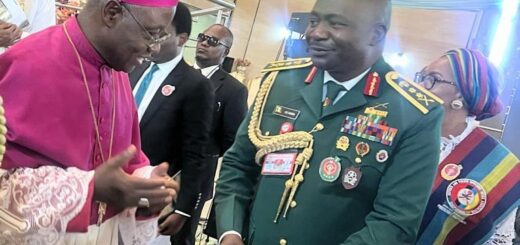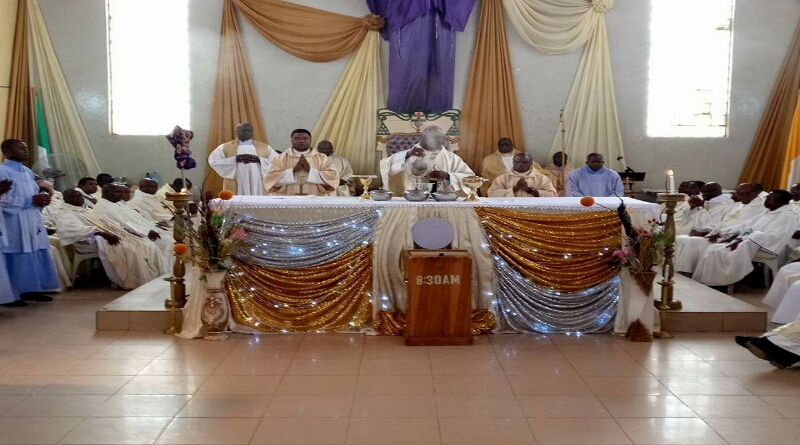My Peace I give to you, the type that the world cannot give
by ARCH BISHOP · May 22, 2022
6th Sunday of Easter, Year C, 22.05.2022, St Peter’s Catholic Church, Nukkai, Jalingo Diocese, Taraba State. Homily by Most Rev. Ignatius A. Kaigama, Archbishop of Abuja
Readings: Acts 15:1-2, 22-29; Rev. 21:10-14, 22-23; Jn. 14:23-29
My Peace I give to you, the type that the world cannot give
It is really a great honour and privilege for me to celebrate this Holy Mass with you in St. Peter’s Catholic Church, Nukkai, Taraba State, where I served Mass in the 1970s, coming from Kona with the priest for Sunday Masses. When I became the Bishop of Jalingo in 1995, I remember making my first purchase of 1.1 million Naira after just a few days of my ordination, of the property where the late Irish Brother, Michael Finnerty, lived and used as the Justice, Peace and Development office for the Diocese of Jalingo. Until my transfer to Jos in 2000, I maintained close contacts with the Church in Nukkai knowing its strategic location and potentials. Today, it is one of the fast growing, dynamic and pastorally vibrant churches in Jalingo Diocese. To God be glory, honour and adoration.
I congratulate you the men, women and youths who have carried on the vision of former catechists, elders and pioneers of the Church in Nukkai.
Last Sunday, Jesus gave us the command; to love others not just as we love ourselves but as He loved us. Today, Jesus continues His sermon on love and prepares our minds for the Holy Spirit, the Counsellor, the Teacher and Reminder. Jesus also announces His Peace to us; a peace so different from what the world offers; a peace capable of transforming hatred into love for one another (cf. Jn. 14:27).
In today’s first reading we learn about one of the problems that came up in the early Church between the Jewish Christians and the Gentile Christians, on the need for non-Jewish Christians to be circumcised after receiving baptism. This was an erroneous teaching that Paul and Barnabas refuted until the matter was brought to the collegial body of the apostles in Jerusalem. This gave birth to the first council ever held in the Church: The Council of Jerusalem.
At the Council under the guidance of the Holy Spirit, the Apostles headed by James, the brother of the Lord, affirmed the position of Paul and Barnabas on the matter and came up with a letter addressed to the Gentile community:
“For it has seemed good to the Holy Spirit and to us to lay upon you no greater burden than these necessary things: that you abstain from what has been sacrificed to idols and from blood and from what is strangled and from unchastity. If you keep yourselves from these, you will do well.” (Acts 15:28-29).
The Apostles were only able to resolve this crisis because of the intervention of the Holy Spirit. If we must avoid the crises and conflicts of our time, we must make the Holy Spirit, an agent of peace and transformation our Advocate and our Partner. Only through the guidance of the Holy Spirit can we face the struggles of this life and succeed in our missionary endeavours as Christians.
The “synodal” way of solving problems in the early church should inspire us to do the same in order to avoid the wrong approach to issues and even fanatical tendencies, leading to the breach of the peace. When the Greek speaking Christians complained about the marginalization of their widows, an acceptable solution was found by the Apostles by electing seven men of repute and filled with the Holy Spirit to serve the material needs of the poor so that the Apostles could concentrate on preaching the Gospel. There was no need for violent demonstrations with the destruction of lives and properties. The same spirit of dialogue and fraternity inspired their decision as we read today, to address the issue of circumcision. We should notice the spirit of consultations, dialogue (round table conference) rather than arbitrary decisions or actions.
In the Gospel, Jesus promises us peace, the kind of peace that the world cannot give. We need this gift from Jesus in these times when we suffer from the lack of peace in our world. More so, Jesus today says to His disciples, “Do not let your hearts be troubled”. Jesus promises us His presence even in the worst situations we find ourselves. In the gospel of Matthew (28:20), He says, “I am with you always even to the end of time”. God says in the Psalms (137:5-6), that “If I forget you Jerusalem let my right hand wither”. Even in the midst of those conditions that humiliate and threaten us, let us not forget the promise of God through the prophet Jeremiah (29:11). He says, “I know the thoughts I have towards you, thoughts of peace and not of evil. I have plans for you, plans for a future filled with hope”.
Through the prophet Isaiah 43:2, God assures each and every one of us, “I have called you by your name; you are mine. When you pass through the waters I will be with you… and it will not overwhelm you. When you pass through the fire, you will not be burnt and the flames will not consume you”. God also tells us in Psalm 23 that He is our shepherd and that when we pass through the valley of darkness and the shadow of death He would be there with His crook and His staff to give us comfort. Even in the midst of what looks finished in the eyes of people, God can begin something surprising. We must face our situations, no matter how gloomy with the faith of the biblical Job. When he lost everything: children, animals, good health etc., he had only one thing to say, “I know that my redeemer liveth” (Job 19:25).
With St. Francis of Assisi, let us pray that the Lord will make us instruments of peace as we strive to live righteously and work for justice in our world. May Jesus the Prince of Peace reign in our hearts, in our families, in our communities and among nations.
The lessons for today:
True religion; the kind that is guided by the Spirit of God does not place any unnecessary burdens on anyone.
We must make the distinction between essentials and non-essentials in religion. The Apostles made it clear to the entire body of Christ that true religion is that which lives according to the dictates of the Spirit of Truth. Hence, while it acknowledges the importance of religious traditions, norms and practices, it is above all concerned with the meaning or the spirit behind the worship that we offer to God.
“Religion that is pure and undefiled before God and the Father is this: To care for orphans and widows in their affliction and to keep oneself unstained by the world” (Jas. 1: 27).
In the different religions we have always witnessed the presence of certain individuals who are out to distort the message of their scriptures with falsehood, tainted by crass ignorance or fanatical aggression.
For us Christians, amidst the world’s confusion, we must listen to the voice of the Holy Spirit and allow Him to guide and direct our affairs. As we draw nearer to the feast of Pentecost, our minds are being prepared for the coming of the Holy Spirit, the One who teaches everything: He teaches us to love, He teaches us the truth, He teaches us how to pray, He brings us forgiveness of sins and peace, and to free us from religious fanaticism and violent extremism.
“Do not revenge, my dear friends, but leave room for God’s wrath, for it is written: ‘it is mine to avenge; I will repay says the Lord” (Rm. 12:19). Beyond the demand for retributive justice, Jesus teaches to “love your enemies and pray for those who hate you” (Mt. 5:44). And this He demonstrated while hanging on the cross saying, “Father, forgive them, for they do not know what they are doing” (Lk. 23:34).
It should disturb us that while we continue to witness the proliferation of places of worship across the nation, the atmosphere can hardly be described as peaceful, with the violent agitations, kidnappings and killings going on. The sad thing is that almost all the penetrators of these acts belong to one religion or the other. This, sometimes, paints the picture that religion is our problem. Our inability to do the right things is the problem.
We must make genuine efforts towards conversion of heart, mind and more importantly, the will to do the right thing, which will bring about equity and justice in the land. We must encourage ourselves to take seriously the call by the Holy Father, Pope Francis on the need to build bridges and extend a hand of brotherhood to those who are not of our religious belief.
Religious leaders must emphasize in their preaching and sermons that we were created for love, not to be enemies of each other. If we continue to claim that our religions are founded on peace then, the challenge is ours to prove to the world that we are a people of peace by word and action.
Let us join hands together to work for peace and never, ever speak or act violently, not to talk of shedding blood, no matter what we feel may be the cause or provocation, and so, do harm to another human being in the name of religion.




